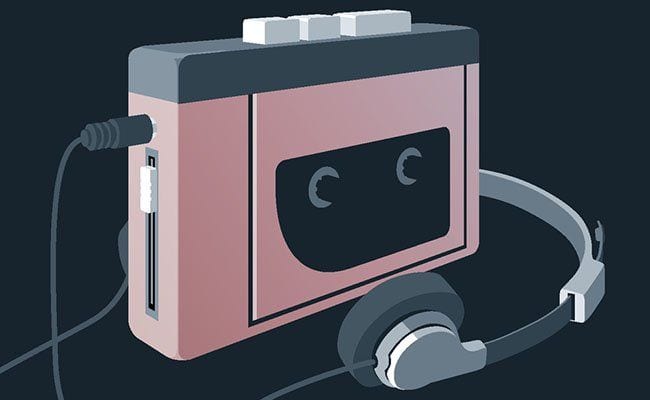
Like many of the last in line for Generation X, I loved cassette tapes and now I miss them dearly. But digging in a little deeper, this may really be more about the portability of cassettes and less about the tapes themselves — something I didn’t realize until I dove into Rebecca Tuhus-Dubrow’s Personal Stereo, one of the many fine installments in Bloombury’s Object Lessons series.
Somewhere in a file cabinet in my office, in a darkened corner containing all the treasured but now useless junk of my teenage years, I still have my Sony Walkman. It was the yellow “sport” edition, its little plexiglass window has fallen out and its original gray and yellow earphones are now glitchy enough to warrant introduction to a trash bin.
That little cassette player saw most of America from a window seat on a Greyhound bus when I was on tour as a slam poet. It saw hundreds of rotations of Ani DiFranco’s early tracks, was best friends with a Neil Diamond greatest hits compilation I stole from my mother, and delivered an endless stream of ’80s mixes that I cribbed off the radio a few minutes at a time throughout most of high school. On the road without much money, I would instantly pony up at the nearest gas station for fresh batteries or earphones when they were needed. Simply put, from the moment it first landed in my possession, I understood that a portable stereo was an absolute necessity.
How did any kid ever get through a family holiday without occasionally slipping off to blast Twisted Sister’s “We’re Not Gonna Take It” for a party of one? How did any teenager ever fall asleep without drowning out the parental units shouting at each other downstairs? How did any young adult ever work up the courage to do anything without first pressing “pause” on a personal theme song? I memorized those tapes, but also the shape and feel of my personal stereo. I knew its precise weight, how to balance it on a knee or the corner of a tray table, where exactly to press on the deck to keep that one slightly mangled tape from getting eaten alive. I knew its battery life calculations and when to Q-Tip the lint out of the reels.
A personal stereo is a kind of companion animal. You come to know it as an extension of yourself and its tribulations are a reflection of your own inner demons. Tuhus-Debrow deftly tracks these precious machinations through global culture, using three chapters that create a history of the personal stereo: novelty, norm, and nostalgia. Beginning with its novelty, she charts the rise of Sony during World War II and the creative partnership that ultimately birthed the first Walkman. There’s an interesting detour into the strangely poetic case of Andrea Pavel, a Brazilian audio technician who also claims to have invented it.
As a novelty headed aggressively toward becoming a norm, the personal stereo was both ubiquitous and hotly debated. Tuhus-Dubrow examines early advertising, the moneyed culture of the ’80s, and some urban myths to explain how the personal stereo was creating conditions for maximum isolation of individuals while simultaneously achieving an utterly new type of shared cultural experience. Remember the first time you ever heard of somebody dying — meandering into traffic or something — because they had on those headphones and weren’t paying attention to the world around them? And never mind how many times your mother said it was bad manners to have that thing on while conversation was taking place all around you.
I look at kids nowadays — with their iPod earbuds sprouting slyly out of their collars or bluetooth Beats wrapped fiercely around their heads — and I’m inexplicably sad for them, that they don’t know the pleasure of having to lug around the bulky, limited technology we had for transmitting music on the go. Having access to bottomless streaming services or 16GB of downloads just isn’t the same. Tuhus-Dubrow tracks the ongoing evolution of personal stereo norms along with the nostalgia impulse for the clunky old technology. A Walkman is the terrain of hipsters now, I guess, or a relic found in sci-fi movies like Guardians of the Galaxy.
The personal stereo is a site of anxiety and also fetishism. It’s had a long life as a commodity and also as a therapy. Tuhus-Dubrow’s valuable historical and pop cultural analysis provides a genuine yet evenhanded portrait of all that has been loved and lost in the way the personal stereo has impacted public spaces and social communication. Personal Stereo is a clear-eyed study on the way this technology continues to disrupt, for better and for worse.
I finished the book not so much wanting to bury my head in the sand and lament our collective future as I wanted to fish around in my old file cabinet and say hello to my ancient Walkman. We had good times together, and it got me through some pretty bad times, too. After all these years, I still can’t just throw it away.

